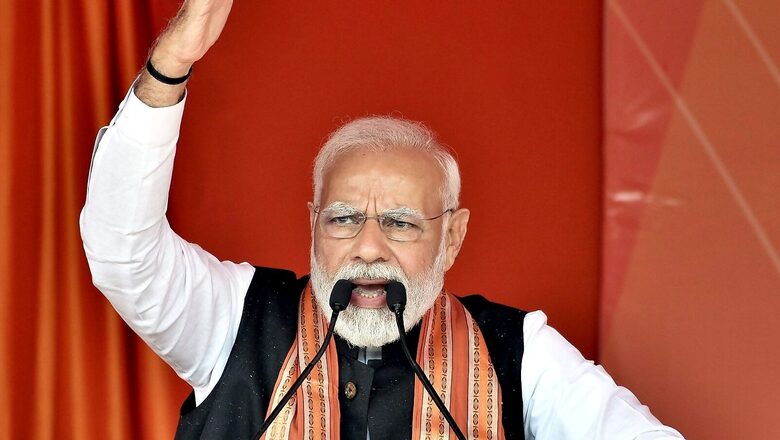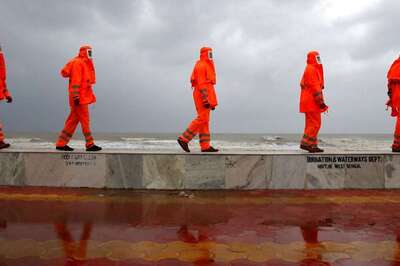
views
The BBC documentary, “India: The Modi Question”, is a political hitjob. If this documentary was produced in 2014 when Narendra Modi became Prime Minister or in 2019 when he led the BJP to an even bigger electoral victory, the context would have been more explicable. But why now, when nothing new has happened on the political front and the next general elections are not imminent. The intention of the documentary is to keep a negative narrative on India under Modi alive internationally, especially when news from India is good on the economic side, the country’s international stature under Modi is growing, his diplomacy is making a mark, and now India seeks to become a voice of the Global South.
The mainstream media in the West has been bent on tarnishing Modi’s image ever since he came to power. A rising India under a strong leader does not fit into established perceptions about India as a country mired with internal problems and not a significant player internationally. Modi, with his agenda of domestic reforms, vaunting India’s inherent strengths as a civilisational country and building a self-confident nation, seeks to change that perception. His international activism and the obvious ambition to make India a global leader are causing agitation in those Western circles that are traditionally ill-disposed towards India and, in particular, a more Hindu India.
The minority issue which caused India’s Partition and remains a source of internal divisions even now is a lever that can be exploited by Western lobbies that are uncomfortable with a rising India, which they fear will make India less manageable and increasingly capable of pursuing a more independent course in international affairs. Woke-ism, with its obsession with minorities, also affects how “anti-minority” trends are seen in Modi’s India. The complex relationship that the West has with Islam, historically and currently, the invasion and destruction of many Islamic countries by the West, the swelling of minority Muslim populations in Europe and the failure to integrate them fully, the concerns about violent extremism and terrorism getting out of hand in European societies, human rights issues and accusations of Islamophobia standing in the way of any robust measures to deal with radical Islamic elements within their own borders, explain to some degree why India is being targeted on the minority issue as a distraction from their own problems.
The role of the UK in the various dimensions of ties with Modi’s India has some special characteristics. As a former colonial power, its ties with India have a particular sensitivity which it does not always heed. It gives at times the impression of taking India for granted. Its ruling class retains the illusion of being an imperial power (as is seen in the manner it is treating Russia currently), which might explain its unresponsive attitude towards some of our legitimate concerns.
The British midwifed Pakistan and possibly see it as their moral duty to protect it politically, which is why they frequently push for an India-Pakistan dialogue, project the Pakistan leadership at various junctures as willing to reach out to India and encouraging India to test their intentions. They have been circumspect on the issue of Pakistani terrorism against India. They have made allowances for Pakistan’s links with the Taliban, despite India’s concerns, and have underplayed the Taliban’s religious extremism and terrorist activities. Pakistan appears to be still seen as a counterweight to India in the subcontinent, and as an entry door for the UK’s role in the region as the ex-colonial power.
On human rights issues, especially in Kashmir, they take shelter behind their democratic system that prevents them from interfering in the working of their parliament by advising the Speaker not to allow debates on the subject at the initiative of Pakistani-origin British MPs. Many of their parliamentary constituencies have a high percentage of people of Pakistani origin, which drives the MPs for electoral reasons to raise the Kashmir and human rights issue in parliament at their behest.
What is unsatisfactory is the response of the government ministers to these debates, in that at times the MPs are thanked for the debate, the UK’s general position on human rights issues is reiterated, and the formula that the Kashmir issue should be settled by India and Pakistan taking into account the wishes of the Kashmiri people is repeated, which means that the issue of sovereignty is not closed in their eyes, elections held in J&K by India and the constitutional changes made by the Indian government are not recognised, and self-determination remains an open question. The UK has not followed the US in now asking India and Pakistan to settle the issue bilaterally, without the earlier reference that they too made to the “wishes of the Kashmiri people.”
All this is in contrast with India not encouraging a parliamentary debate in our parliament on our many grievances against Britain, including on the interference in our internal affairs by their parliament, their equivocation on the Kashmir issue, not keeping us fully in the loop on their policy on Afghanistan, giving safe haven to absconders from Indian law for financial crimes, and not moving on extradition issues. The little-too-clever argument now used by the British is that given the sub-continental diaspora in their country, there is an inevitable spillover of happenings in India into Britain, be it the revision of Article 370, the Citizenship Amendment Act, the Delhi riots, etc, and hence our problems become theirs too.
The British also use the argument of free speech and right to peaceful protest to allow demonstrations by Pakistani and Khalistani lobbies against our High Commission despite our protests and despite India being a friendly country. Their agencies are well aware of the forces behind these demonstrations but refuse to keep them away from proximity to our mission. This contrasts with India not encouraging counter demonstrations against the UK High Commission in India as we treat the UK as a friendly country. We even keep a curb on demonstrations against the Chinese Embassy despite our adversarial ties with China, knowing the political implications of allowing such demonstrations.
The outburst by Home Secretary Suella Braverman under the Liz Truss government on jacked-up concerns about open-ended Indian migration into the UK if the mobility agreement under negotiation went through reflected the undercurrents of political and bureaucratic lobbies in the UK that are antipathetic to India. Braverman, who is an unabashed admirer of the British colonial empire, has been inducted again as Home Secretary in Prime Minister Rishi Sunak’s government, which is not reassuring. Without recalling the “Yes Prime Minister” series, it is well established that the bureaucracy in the UK is powerful, as is to be expected of any structured civil service. We are occasionally told at the level of British Prime Ministers themselves about the need to overcome bureaucratic resistance within their system to initiatives towards India at the political level.
This should not be surprising as elements in the bureaucracy in India without having lived through the British colonial period here are distrustful of the UK, as they suspect its role in the region and policies towards us. Likewise, the bureaucracy in the UK would have its own views about India rooted in the history and psychology of an erstwhile imperial power that no longer holds sway in the region. The very negative press we get in the UK, what with the empire nostalgic Economist and those permeated with leftist ideology like The Guardian, is not unconnected with links with the British establishment which includes the bureaucracy, the intelligence agencies, the think tanks and civil society activists.
The view that the BBC’s anti-Modi documentary was an indirect swipe at the Indian-origin Hindu Prime Minister of the UK may have some element of truth in it. This might explain in part his very brief and tepid response to the defamatory allegations against Prime Minister Modi in the documentary listed by the Pakistan-origin British MP. Prime Minister Sunak obviously did not want to be seen to be robustly defending the Indian Prime Minister to avoid being smudged as a Hindutva sympathiser and implicitly sharing his perceived anti-Muslim leanings.
But then, the issues raised in the documentary are a rehash of all that has been alleged, discussed and investigated in India for years, and do not seem linked to the future course of India-UK ties, the 2030 Road Map or the FTA under discussion. They are rooted in internal politics in India, with known Modi-baiting Indian activists. That Jack Straw gave an interview to The Wire is added confirmation of the intent of this documentary to give a fillip to anti-Modi elements in India and sustain an anti-Modi narrative abroad.
Kanwal Sibal is a former Indian Foreign Secretary. He was India’s Ambassador to Turkey, Egypt, France and Russia. The views expressed in this article are those of the author and do not represent the stand of this publication.
Read all the Latest Opinions here




















Comments
0 comment